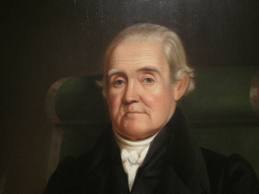
Noah Webster is called the “Father of American Education” today and indeed he was the primary founder of the educational system of the early Republic. Webster firmly believed in God and he believed that the best education a child could get was through learning the principles of Christianity. Although he is mostly remembered today for his educational principles, his reform of the English language and his first American dictionary, he was also influential in the political foundation of our country and the principles of American government. He also stressed the importance of morality in government.
Webster was born in West Hartford, Connecticut in 1758 to parents Noah Sr. and Mercy. He left for Yale College just before his sixteenth birthday and served in the Connecticut militia during the American Revolution. His primary education in West Hartford had been mediocre at best and young Webster vowed to make education better. He got a job as a school teacher but this job was difficult for Webster because of its time demands. While teaching, Noah also studied law, first under Oliver Ellsworth. He wrote his famous “Blue-Backed Speller” in 1785. He also wrote extensively on political subjects and advocated American Nationalism. In 1831, he and his cousin, Daniel Webster, lobbied for a copyright law in the United States, which was passed.
Arguably, his most enduring work was his dictionary. He reformed English spelling and created a new “American” spelling system. He dropped certain letters from words such as changing “colour” to “color” and switching letters around such as changing “centre” to “center”. This system of spelling became a distinctly American way of spelling words and further distinguished the United States from its old mother country Britain. Webster was also a Bible scholar and he made his own version of the Bible, based off the King James Version, using contemporary language coupled with Greek and Hebrew studies.
Webster did much to make America’s education system “American”. He also stressed the need for morality in government and he advised the common people to vote based on a man’s character and not his promises or partisan alignment. Webster died in 1843 leaving a monumental legacy behind him.
Here are some quotes by Noah Webster:
